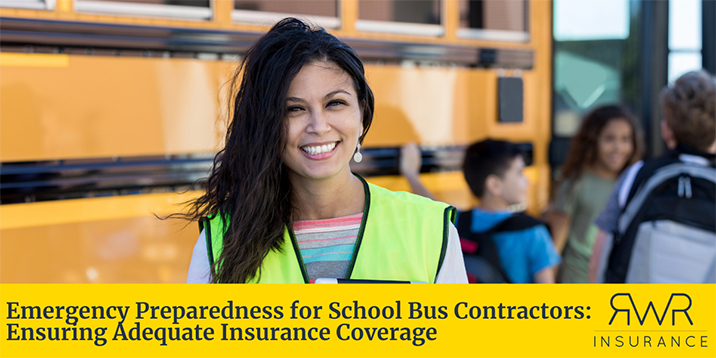As a school bus contractor, ensuring the safety and well-being of students is your top priority. In addition to maintaining safe buses and hiring qualified drivers, having robust emergency preparedness and adequate insurance coverage is essential. This blog explores the critical aspects of emergency preparedness for school bus contractors and highlights the importance of securing comprehensive insurance coverage to safeguard your operations.
Why Emergency Preparedness Matters
Emergency situations on the road can arise unexpectedly, from accidents and breakdowns to severe weather conditions and medical emergencies. Being prepared not only ensures the safety of the students but also minimizes liability and operational disruptions. Here’s why emergency preparedness is crucial for school bus contractors:
- Protecting Lives: The primary goal is to protect the lives of students and staff. Preparedness involves training drivers and staff on emergency protocols, ensuring they know how to respond quickly and effectively in various situations.
- Minimizing Liability: Adequate preparation and insurance coverage help reduce the risk of lawsuits and claims. Having a clear plan and sufficient coverage demonstrates your commitment to safety and compliance, enhancing your credibility with schools, parents, and regulatory bodies.
- Ensuring Continuity: Emergencies can disrupt operations. Having a robust emergency plan and insurance coverage ensures that you can resume services promptly, minimizing downtime and maintaining trust with your clients.
Key Components of Emergency Preparedness
1. Develop a Comprehensive Emergency Plan
A well-structured emergency plan is the foundation of your preparedness strategy. It should include:
- Emergency Contact Information: Maintain an updated list of emergency contacts, including local authorities, medical facilities, and key personnel.
- Evacuation Procedures: Clearly outline evacuation routes and procedures for different scenarios, such as accidents, fires, or natural disasters.
- Training and Drills: Conduct regular training sessions and drills for drivers and staff to ensure they are familiar with emergency protocols and can respond effectively under pressure.
2. Equip Your Buses with Safety Features
Ensure that your buses are equipped with essential safety features, such as:
- First Aid Kits: Stock buses with first aid supplies and ensure drivers are trained in basic first aid and CPR.
- Emergency Communication Devices: Install communication devices, such as two-way radios or cellular phones, to facilitate communication with dispatch and emergency services.
- Safety Signage and Equipment: Use clear signage and safety equipment, including fire extinguishers and emergency exits, to enhance safety on board.
The Role of Insurance in Emergency Preparedness
Having the right insurance coverage is a critical component of your emergency preparedness plan. Here’s what you need to consider:
1. General Liability Insurance
General liability insurance covers claims related to bodily injury or property damage that occur during your operations. It’s essential for protecting against lawsuits arising from accidents or incidents involving your buses.
2. Auto Liability Insurance
Auto liability insurance is mandatory and covers legal costs and settlements if your bus is involved in an accident that causes injury or property damage. Ensure your policy meets or exceeds the minimum coverage requirements set by state and federal regulations.
3. Physical Damage Insurance
This coverage protects your buses against damage from accidents, vandalism, or natural disasters. It ensures that you can repair or replace damaged vehicles without significant financial strain.
4. Umbrella Insurance
Umbrella insurance provides additional coverage above and beyond your primary policies. It offers an extra layer of protection, covering liability claims that exceed the limits of your general liability or auto liability insurance.
5. Workers Compensation Insurance
Workers compensation insurance is vital for covering medical expenses and lost wages for drivers and staff injured on the job. It’s a legal requirement in most states and essential for protecting your employees’ well-being.
Best Practices for Ensuring Adequate Coverage
- Review Your Policies Regularly: Periodically review your insurance policies to ensure they provide adequate coverage. Adjust your limits and add endorsements as needed to address any changes in your operations or risks.
- Consult with an Insurance Advisor: Work with an experienced insurance agent or broker who specializes in commercial vehicle and liability insurance for school bus contractors. They can help you navigate the complexities of coverage options and tailor a policy that meets your specific needs.
- Stay Informed About Regulations: Keep abreast of local, state, and federal regulations related to school transportation. Ensure your insurance coverage complies with all legal requirements and industry standards.
- Document and Train: Maintain detailed records of your emergency preparedness plan, training sessions, and drills. Ensure that all drivers and staff are well-trained and familiar with the procedures.
Emergency preparedness is not just a safety measure; it’s a critical aspect of running a responsible and reliable school bus contracting business. By developing a comprehensive emergency plan and securing adequate insurance coverage, you can protect the lives of students, minimize liability, and ensure the continuity of your services.
For personalized advice on insurance coverage or assistance in enhancing your emergency preparedness plan, don’t hesitate to contact us. We are here to help you safeguard your business and keep your students safe on the road. Stay safe and drive with confidence!
Disclaimer: The content provided in this blog is for informational purposes and should not be considered an offer for coverage. Each insurance policy is unique and may have varying terms, conditions, and exclusions. It is essential to consult with a qualified insurance professional or licensed agent for personalized advice tailored to your specific needs. This blog does not constitute a contract, policy, or guarantee of coverage. Always refer to your individual policy documents for full details.

